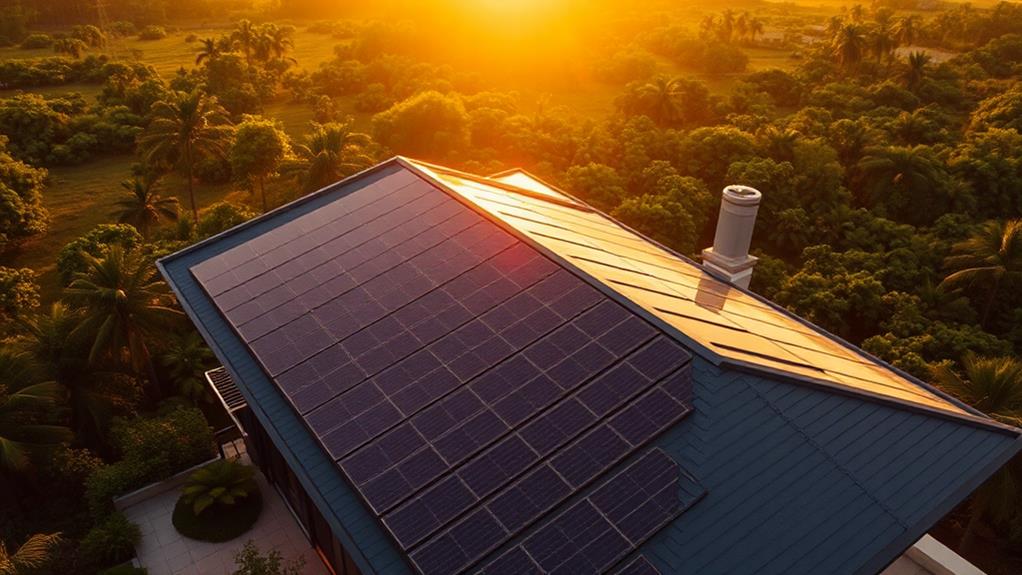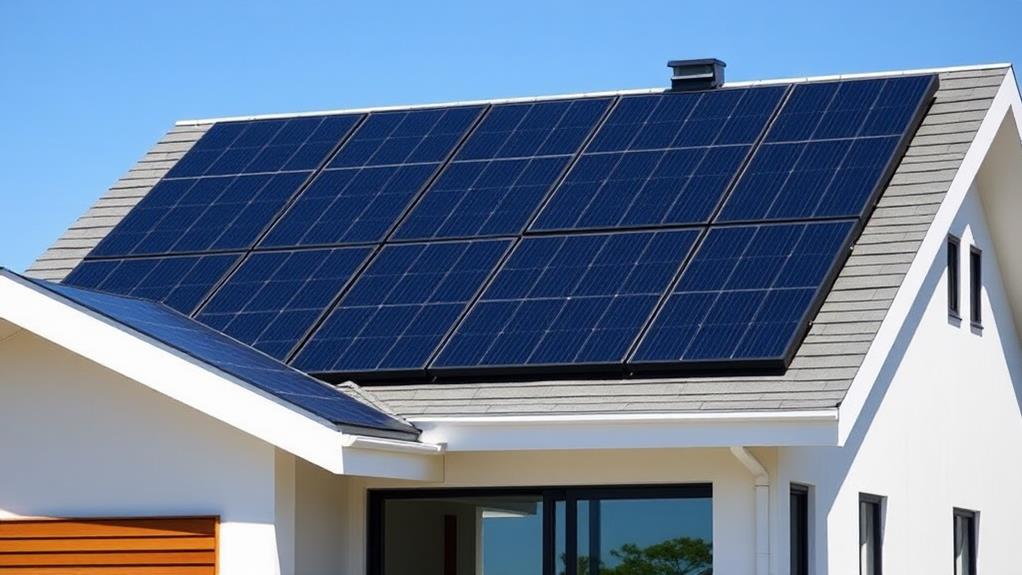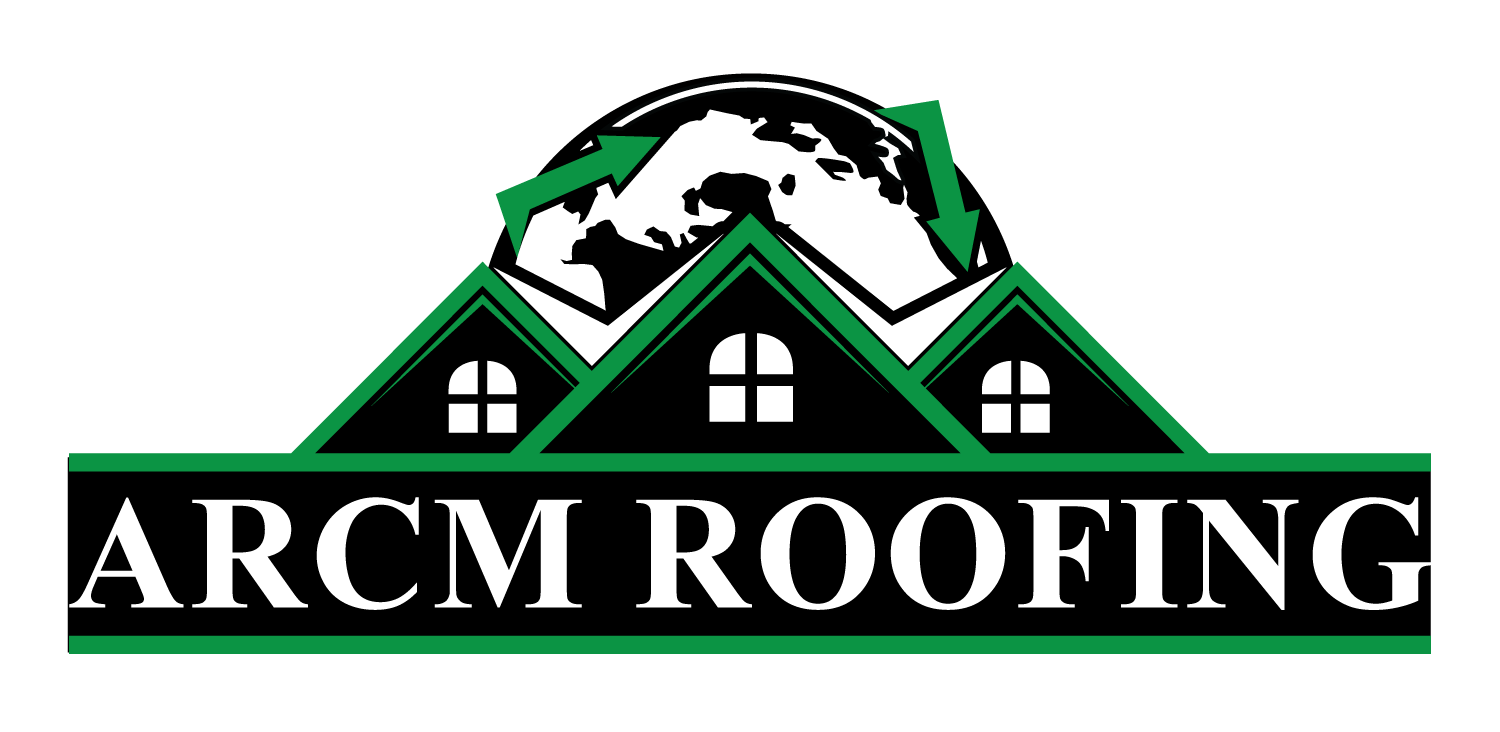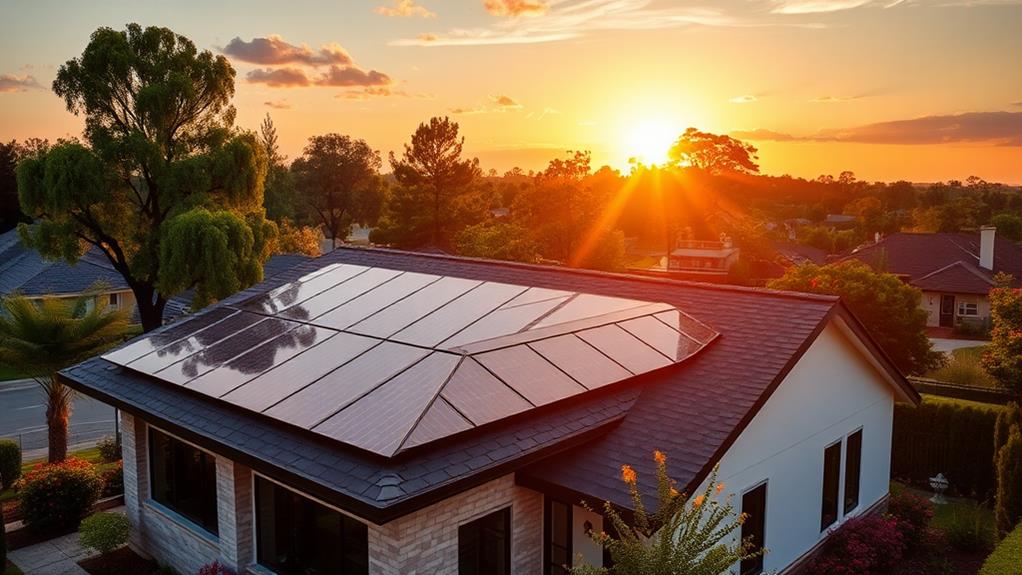Solar panel roofing for homes is a strategic investment that marries environmental responsibility with significant economic advantages. These systems harness inexhaustible solar energy, effectively reducing reliance on fossil fuels and curbing greenhouse gas emissions. Homeowners benefit from substantial reductions in electricity expenses and enjoy increased property values, which appeal to eco-conscious buyers. Advanced solar panels, boasting 15-22% efficiency, are complemented by battery storage systems to enhance residential energy management. Installation involves a meticulous process: from site assessments and tailored designs to secure mounting and electrical integration. For those interested, exploring further can reveal more about this transformative energy solution.
Roofing Highlights
- Solar panels reduce electricity bills by transforming homes into power-generating units with government incentives accelerating savings.
- Solar panel installations enhance property value, appealing to eco-conscious buyers and increasing marketability.
- The initial investment in solar panels is offset by long-term financial benefits and reduced reliance on grid electricity.
- Solar roofing systems significantly reduce carbon emissions by decreasing reliance on fossil fuels.
- Custom installation options ensure solar panels aesthetically integrate with existing home architecture.
Solar Panel Roofing Overview

The adoption of solar panel roofing offers significant benefits by harnessing renewable energy, which not only reduces environmental impact but also provides long-term cost savings for homeowners. Proper installation is indispensable to guarantee maximum performance and safety. Installation involves multiple steps, such as assessing the home's current roof condition and ensuring structural stability for solar panel addition.
Roof installation guidelines emphasize the importance of these steps. Understanding the installation process is pivotal as it involves an analysis of the best positions for panels to capture ideal sunlight. A thorough analysis of costs and efficiency highlights the financial and energy outputs of such systems, aiding homeowners in making informed decisions regarding their investment in sustainable technology.
Benefits of Renewable Energy
Harnessing the power of the sun through solar panel roofing offers numerous benefits that extend beyond individual homes to the broader community and environment. Firstly, solar panels provide an inexhaustible energy source, crucial at a time when traditional fossil fuels are steadily declining and causing environmental harm. By shifting to renewable energy solutions, communities can significantly reduce their carbon footprints, fostering a healthier planet and demonstrating collective responsibility towards combating climate change.
Moreover, solar panel roofing tends to be financially advantageous in the long term. Homeowners can witness substantial savings on electricity bills due to the natural energy production these panels facilitate. In some regions, governmental incentives, including tax credits and rebates, make switching to solar even more economically viable, further integrating users into a sustainable energy community. Such incentives not only uplift the individual but also stimulate local economies by creating new jobs within the renewable sector.
In addition to these economic and environmental incentives, solar panel systems are known for their reliability and low maintenance requirements. Offering a peace of mind, they empower households to become self-sufficient in energy generation, enhancing community resilience and fostering a sense of shared progress toward a sustainable future.
Installation Process Steps
Installing solar panel roofing entails a well-structured process that guarantees peak functionality and efficiency. This encompasses several key stages, each meticulously crafted to ensure seamless integration with your home and optimize energy yields.
Initially, a comprehensive site assessment is conducted. This involves evaluating your roof's orientation, tilt, shade patterns, and structural integrity, confirming it can effectively support the solar system. Following this, a customized design plan is developed, tailored specifically to your property's unique characteristics and energy requirements. These preliminary steps fortify the foundation for a successful installation.
Next, obtaining the necessary permits and complying with local regulations is paramount. This phase may vary in duration based on jurisdictional stipulations, yet securing these approvals before physical installation is pivotal. Upon receiving the green light, the installation process begins with mounting the racks that will securely hold the panels. The solar panels are then installed carefully, with emphasis on precision to maximize sunlight exposure. After the panels are secured, electrical components are connected, integrating your new system with existing power infrastructure. The final stage involves rigorous testing and commissioning, verifying that everything functions as intended and providing you with a sustainable energy solution.
Cost and Efficiency Analysis
While the installation process guarantees the successful integration of solar panel roofing, examining the associated costs and importance is crucial for making informed decisions. Solar panel roofing involves initial investments that vary based on factors such as the type of panels, complexity of installation, and geographical location. Costs can range from $15,000 to $30,000 for a standard-sized home, often including materials, labor, and potential permit fees. Despite the upfront expenditure, long-term financial benefits frequently materialize through reduced electricity bills and available state or federal incentives, ultimately accelerating return on investment.
The efficiency of solar panel roofing is equally significant, as it directly impacts energy output and cost-effectiveness. Modern solar panels typically convert around 15-22% of sunlight into usable energy, influenced by panel quality, angle, and local climate conditions. Advanced technologies continue to improve this efficiency, offering homeowners increased energy independence. Additionally, by pairing solar panels with battery storage systems, surplus energy can be stored for use during cloudy days or peak demand times, further optimizing home energy management. For communities invested in sustainable practices, solar panel roofing presents a pathway not only to environmental stewardship but also to economic freedom.
Benefits

The integration of solar panel roofing in residential homes presents numerous advantages, beginning with significant energy cost savings by harnessing renewable solar energy, which effectively reduces electricity bills over time.
Moreover, using solar panels can help protect against the harsh elements by acting as an additional layer on the roof, similar to how roofs provide protection against rain, snow, sunlight, extremes of temperature, and wind.
Additionally, homeowners can enjoy a modern aesthetic while maintaining quality roofing services. Adopting solar technology is a proactive step towards decreasing one's environmental footprint, contributing to a substantial reduction in greenhouse gas emissions.
In addition to these financial and ecological benefits, the installation of solar panels can enhance property value, providing homeowners with a long-term investment that is likely to attract eco-conscious buyers.
Energy Cost Savings
Harnessing the power of the sun through solar panel roofing offers substantial energy cost savings for homeowners. This innovative technology transforms homes into power-generating units, reducing reliance on grid electricity and thereby decreasing utility bills significantly. Given the average household's consumption patterns, solar panels can offset a substantial portion of energy needs, resulting in immediate reductions in monthly expenses. The initial investment may be considerable, yet it is counterbalanced by long-term financial benefits, householders experiencing noticeable savings over the system's lifecycle.
Federal and local incentives further enhance the economic appeal of solar panel roofing, with tax credits and rebates offering additional savings opportunities. As electricity prices fluctuate, investing in solar technology guarantees stability, shielding consumers from market volatility and providing a predictable energy budget. Additionally, solar panel systems increase property values, making them an attractive proposition for those planning to sell their homes in the future.
Communities adopting solar solutions contribute towards a shared initiative of sustainable living, fostering a sense of unity and collaboration. As the world moves towards more sustainable energy sources, solar panel roofing not only promises individual economic benefits but also aligns homeowners with a larger movement towards innovative, cost-effective, and environmentally conscious practices.
Environmental Impact Reduction
Solar panel roofing not only provides economic advantages but also plays an essential role in reducing environmental impact. By harnessing the sun's energy, solar panels markedly decrease reliance on fossil fuels, contributing to the reduction of greenhouse gas emissions. This shift is pivotal in mitigating climate change and maintaining a healthier ecosystem.
The utilization of solar energy curtails air pollutants, such as carbon dioxide and sulfur dioxide, by offsetting traditional energy sources that are typically associated with high emissions.
Furthermore, solar panel roofing aids in decreasing water consumption, as water is often used extensively in conventional electricity production processes. By generating energy directly from sunlight, this sustainable method conserves critical water resources, supporting communities in preserving their natural environments. Additionally, solar panels create minimal noise pollution, contributing to maintaining the serenity of residential areas.
Implementing solar panel roofs embodies a collective step towards a more sustainable future, encouraging community participation in environmental preservation efforts. The adoption of this technology creates an intrinsic sense of contribution and belonging to the broader global effort of combating environmental degradation. As more households make the changeover to renewable energy, the collective impact becomes substantial, fostering a shared commitment to protect our planet for future generations.
Increased Property Value
Few upgrades contribute to a home's value and appeal quite like solar panel roofing. This modern enhancement is not merely an eco-friendly trend; it represents a sound financial investment that resonates with prospective buyers' increasing demand for sustainable living options.
By installing solar panels, homeowners effectively position their property as part of the future-forward housing market, where eco-conscious choices translate into tangible economic benefits. Statistically, properties with solar installations witness an increase in market value, often commanding a premium over their non-solar counterparts.
This surge in property value can be attributed to several factors. First, solar panels diminish energy costs substantially, providing an attractive incentive for potential buyers. The promise of reduced utility bills is appealing to those seeking long-term savings and energy independence.
In addition, solar panels signal a commitment to environmental responsibility, often aligning with the values and aspirations of modern homebuyers who prioritize sustainability. Additionally, governmental incentives and rebates further amplify the financial appeal of solar roofing, as they can offset initial installation costs and enhance overall return on investment.
Consequently, solar panel roofing not only elevates property aesthetics and efficiency but also solidifies its market worth, fostering a sense of ecological and communal belonging.
Customized Installation Options Available

As homeowners increasingly shift towards renewable energy solutions, the demand for customized installation options in solar panel roofing has surged, offering tailored system designs that adapt seamlessly to individual energy requirements and architectural styles. With a plethora of diverse material choices at their disposal, homeowners can select from various finishes and configurations to complement the existing structure of their homes, while personalized aesthetic solutions guarantee that solar installations do not disrupt the visual cohesion of the property. The table below summarizes some of these key options available.
| Installation Feature | Description |
|---|---|
| Tailored System Designs | Custom-fit energy solutions based on homeowner needs |
| Diverse Material Choices | Various finishes and configurations available |
| Aesthetic Solutions | Visual harmony with existing home architecture |
Tailored System Designs
Customized installation options for solar panel roofing offer homeowners the advantage of developing tailored system designs that precisely meet their specific energy needs and architectural preferences. This personalization guarantees that each system is not only efficient but seamlessly integrates with the home's existing design aesthetics, creating a harmonious blend of functionality and visual appeal. Solar panel experts assess unique factors such as roof orientation, local climate conditions, and energy consumption patterns to engineer solutions that optimize performance.
By working closely with professionals, homeowners can choose configurations that utilize the available roof space most effectively, whether deploying panels across multiple roof sections or incorporating innovative mounting systems for less intrusive installations. This process not only supports maximum energy generation but also respects structural integrity and local building codes.
Furthermore, a custom-tailored design facilitates the inclusion of advanced technologies, such as smart inverters or battery storage systems, enhancing energy independence and resilience. Such innovations promise to meet evolving energy demands and sustain eco-conscious living. Ultimately, the emphasis on personalized solar solutions reflects not just energy efficiency, but also an invitation to the homeowner to participate in a more sustainable, community-focused future, aligned with shared environmental values.
Diverse Material Choices
Homeowners' choices in roofing materials for solar panel installations have expanded considerably, offering a range of diverse materials that cater to various aesthetic and functional needs. From traditional asphalt shingles to metal and tile, these materials are increasingly compatible with solar technology, enabling homeowners to blend renewable energy systems seamlessly with their existing structures. This expansion not only supports greater integration of solar technology but also addresses individual preferences, providing a sense of personalization and inclusivity in design.
Customized installation options are now more prevalent, adapting various roofing materials to better accommodate solar panels. Metal roofs, for example, with their durable and long-lasting nature, offer an excellent foundation for solar panels, minimizing installation complexities and maintenance costs. Additionally, tile roofs provide aesthetic diversity, allowing for visually appealing outcomes without compromising on energy efficiency.
Innovations in solar technology have also made it possible to integrate solar panels directly into roofing materials, such as solar shingles or tiles, offering an even broader spectrum of compatible options. These diverse material choices facilitate that households can choose solutions tailored specifically to their needs, fostering a harmonious balance between functionality and the desire for eco-friendly living, while cultivating a profound connection to sustainable energy practices.
Personalized Aesthetic Solutions
Offering bespoke aesthetic solutions for solar panel roofing creates significant appeal for those aiming to blend functionality with visual harmony. Personalized aesthetic solutions within solar panel roofing address homeowners' desires to not only increase energy efficiency but also curate a visually cohesive environment that reflects personal style and architectural integrity.
This intricate balance between practicality and appearance holds paramount importance within communities that cherish both green practices and aesthetic enrichment. Diverse customization options include color matching, tile integration, and varying panel shapes and sizes to seamlessly align with existing architectural features.
The ability to choose from an array of finishes guarantees that roof installations do not disrupt but rather enhance the home's overall design narrative. When selecting personalized solutions, homeowners can drive positive environmental impacts without undermining the distinctive character of their residences.
Advanced technologies allow installers to provide tailored solutions, such as invisible solar shingles, which blend impeccably with traditional roof materials while optimizing solar energy capture. The emphasis on aesthetics does not compromise efficiency; instead, it emphasizes an integrated design approach.
These carefully calibrated offerings acknowledge individual preferences and community trends, fostering a shared culture that values both sustainability and visual appeal.
Connect With Us
Ready to take your home's energy efficiency to the next level? Connect with us today and discover how solar panel roofing can transform your home into a sustainable powerhouse.
Our experts are here to guide you every step of the way, from consultation to installation. Don't wait—embrace the future of energy with us! Call us now at (303) 306-8384 and start your journey toward a brighter, greener tomorrow.
Roofing FAQ
How Long Do Solar Panel Roofs Typically Last?
Typically, the lifespan of solar panel roofs extends to 25-30 years, fostering sustainable energy communities. Integrating such systems into homes promotes environmental responsibility, portrays commitment to innovation, and fosters collective stewardship among conscientious homeowners.
Are There Any Government Incentives or Rebates Available for Solar Panel Installation?
Governments globally offer various incentives and rebates to encourage sustainable energy adoption, fostering a community-driven approach. These may include tax credits, grants, or subsidized financing options, demonstrating a shared commitment towards environmental responsibility and energy independence.
What Are the Maintenance Requirements for Solar Panel Roofing?
Maintenance requirements involve regular cleaning to remove dust and debris, periodic inspections for wear or damage, and ensuring ideal performance by monitoring system output. Engaging professionals for routine service checks fosters a sense of community and reliability.
Can Solar Panel Roofing Be Installed on All Types of Homes?
Installation feasibility depends on factors such as roof orientation, slope, and material compatibility. While many homes can accommodate solar installations, specific structural considerations are necessary to guarantee superb performance, emphasizing the importance of professional assessment and tailored solutions.
How Does the Installation Process Affect the Existing Roof Structure?
The installation process can greatly impact the existing roof structure by necessitating structural assessments and minor adjustments to maintain integrity. Qualified professionals are essential, fostering a sense of community trust and guaranteeing that the existing roof remains secure.




